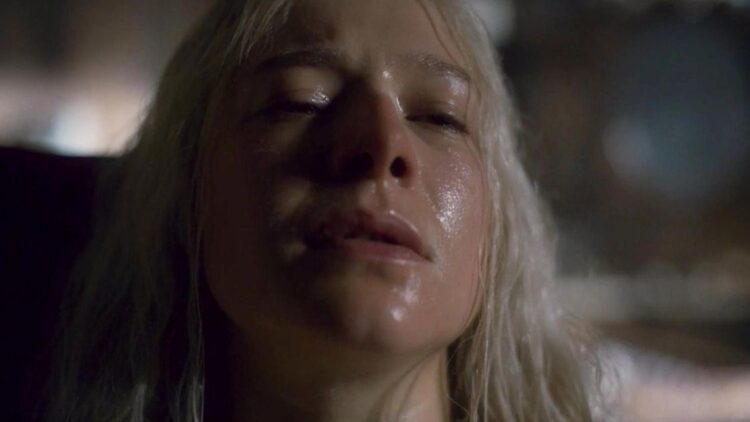“Fire and Blood” may be the words of House Targaryen, but “Blood, Guts, and Violence” would certainly be those of House of the Dragon and Game of Thrones . As great as these respective series undoubtedly are, part of our fascination with them is the violence.
Enacting violence is an intrinsically human quality, a trait shared with only a handful of other animals on this planet. But after the most recent episode of House of the Dragon , critics are beginning to wonder if limits have been pushed too far and if these violent birth scenes are the show’s new form of violence against women .
HBO’s new prequel series, ‘House Of The Dragon’ has proven to be every bit as formidable as its predecessor.

Although the series was initially met with heavy speculation and doubts from a vast majority of GoT fans, House of the Dragon has exceeded all expectations thus far.
In fact, there are those who would argue that ‘House Of The Dragon’ is the superior series.

Don’t hear what I’m not saying: Game of Thrones is one of the most iconic shows in HBO’s history. But there’s no denying that the series peaked after a certain point.
At its best moments, ‘House Of The Dragon’ is every bit as exciting, bloody, and violent as ‘Game Of Thrones’ ever was.

Speaking of which, let’s talk about the blood and violence for a moment — particularly as it pertains to violence against women.
In ‘Game Of Thrones’, there are a number of incredibly controversial rape/sexual assault scenes.
The first of which occurs when Daenerys Targaryen is raped by her husband, Khal Drogo, on the night of their wedding all the way back in Season 1.
In Season 4’s “Breaker Of Chains”, Cersei Lannister is sexually assaulted by her own brother.

What makes this scene even more difficult to watch is the fact that Jaime forces himself upon Cersei right next to the fallen body of their dead son.
Lastly, in Season 5’s “Unbowed, Unbent, Unbroken,” Theon Greyjoy looks on in terror while Sansa Stark is brutally raped by Ramsay Bolton.

I also forgot to mention Season 4’s “The Mountain and the Viper,” wherein Ser Gregor Clegane confesses to raping Ellaria Martell before brutally murdering her.
You get the point, ‘Game Of Thrones’ has always possessed an air of brutality. Specifically, brutality enacted toward women.

From what we’ve seen thus far in House of the Dragon , some have argued that the prequel series shares this offputting predilection, albeit in a different way.
Instead of rapes and sexual assaults, ‘House Of The Dragon’ has depicted some of the most brutal birth scenes in television history.
In the premiere episode, “The Heirs of the Dragon,” King Viserys I’s wife, Aemma Arryn, dies due to intense trauma and blood loss brought on by a horrific C-section gone wrong.
In Sunday’s most recent episode, “The Princess and the Queen,” Princess Rhaenyra is forced to endure a bloody and painful walk, immediately after childbirth.

Audiences watched as Rhaenyra forced out her afterbirth, leaving an ominous trail of blood from one end of the castle to the other.
In that very same episode, Lady Laena Velaryon commits suicide by dragon fire after a stalled childbirth.

Instead of dying under the maester’s knife, like Aemma Arryn, Lady Laena takes matters into her own hands and compels her dragon, Vhagar, to immolate both her and her unborn child.
Many critics have accused ‘House Of The Dragon’ of trading sexual violence for gruesome birth trauma.

“As I watched each birth unfold, I was instantly reminded of the worst of the rape scenes on Thrones ,” writes Kelly Lawler of USA Today.
“The spectacle of the violence was the focal point. So was the pain and trauma of the woman, not realism or the experience of the mother.”

Director Miguel Sapochnik, who worked on the original GoT series, has offered up a different perspective on the brutal birth scenes.
“Each birth in this show has a theme, just as the battles I’ve filmed in the past have a central concept,” he told ‘The Los Angeles Times’.

“The hope and intention of the show, beyond the primary one of entertainment, is to shine a light on how the experience of men and women in this world has parallels to our own past and present .”
So far, the Twitterverse appears to be divided on the topic.
Some appear to be all for the brutally honest depictions of medieval-style childbirth. On the other hand, Twitter user @Friend_Number01others was quick to point out, “The[sic] have more people die of childbirth then[sic] swords on this show.”
‘HOTD’ and ‘GOT’ are brutal at times, but do they really discriminate between the sexes?

Khal Drogo once dumped a pot of molten gold over Viserys II’s head. Theon Greyjoy was mercilessly castrated by Ramsay Bolton, and just last Sunday — Larys Strong cut out the tongues of a group of male prisoners. To try and argue that these series are misogynistic is to find quarrels in a straw and to turn a blind eye to the harsh realities of Westeros and the real world.

















































